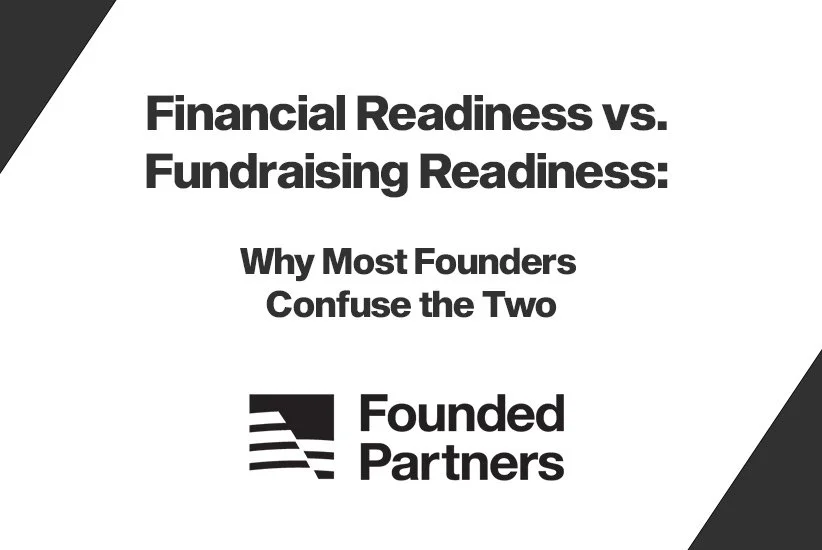Financial Readiness vs. Fundraising Readiness
Founders often conflate two essential but distinctly different aspects of running a business: financial readiness and fundraising readiness. This confusion frequently results in unexpected delays, reduced valuations, or even failure in securing investment. To avoid these pitfalls, it’s crucial for founders to understand and master both financial readiness—strong internal financial operations—and fundraising readiness—the preparation required to attract external investment.
Defining Financial Readiness:
Financial readiness involves maintaining robust financial practices and internal management of company resources. It includes clear and well-organized accounting practices, healthy cash flow management, accurate budgeting, and reliable forecasting. Effective financial controls and governance are fundamental. Companies demonstrating financial readiness typically produce consistent financial reports, maintain transparency in their finances, and manage resources efficiently to support sustainable growth.
Defining Fundraising Readiness:
Fundraising readiness, on the other hand, means your business is prepared to withstand external scrutiny by potential investors. This involves more than just presenting attractive financial statements. It demands rigorous preparation of corporate documents, clarity in operational narratives, financial models aligned to realistic market conditions, and a well-articulated strategy for growth and profitability. This is not merely about internal processes—it’s about shaping perceptions externally.
The Crucial Role of Due Diligence:
Due diligence is the process by which investors assess risks and validate the claims made by the company seeking investment. A comprehensive and successful due diligence process reassures investors, increases valuations, and expedites investment. Conversely, a poorly executed or incomplete due diligence process can derail investments, damage credibility, and result in significant delays. Thus, it is essential for founders to preemptively address common investor concerns and maintain readiness at all times.
Getting Your House in Order:
Board and Governance:
Ensure all board resolutions are signed and up to date.
Maintain a regularly updated minute book.
Demonstrate good governance practices clearly through organized documentation.
Legal and Employment:
Formalize employment contracts for every team member, with particular attention to founder agreements.
Clearly document ownership and licensing of intellectual property.
Keep a well-organized and up-to-date repository of all critical contracts and agreements.
Financial Preparation:
Develop investor-ready financial models, clearly outlining historical results, projections, and underlying assumptions.
Prepare supporting documents validating your projections and financial statements.
Maintain detailed documentation of the financial drivers and key metrics of your business.
Market and Go-to-Market Strategies:
Clearly articulate your understanding of your target market and competitive landscape.
Define and document robust go-to-market strategies validated by market data or customer traction.
Demonstrate clear market need or existing customer validation to reassure investors of your business’s viability.
Capitalization Structure:
Finalize and clearly document your cap table, reflecting accurate equity distribution.
Determine and document the specific fundraising mechanism you intend to utilize, whether equity, preferred shares, SAFE, or convertible debentures.
Ensure transparency and clarity for investors regarding ownership stakes and potential dilution.
Market Awareness and Strategy Alignment:
Cultivate a deep understanding of current market conditions and trends relevant to your sector.
Align your valuation and raise strategy realistically with current market conditions to avoid investor skepticism.
Prepare to effectively address investor queries on market dynamics, demonstrating a comprehensive market intelligence.
Common Pitfalls and How to Avoid Them:
Lack of Documentation:
Failing to maintain updated and accessible documentation often results in due diligence failures. Avoid this by regularly auditing and organizing corporate, financial, and operational documents.
Unrealistic Projections:
Avoid inflated financial projections or overly optimistic market assumptions. Investors appreciate realistic forecasts supported by robust market analysis.
Incomplete Employment Agreements:
Ensure that all team members, particularly founders, have clear, written contracts detailing roles, compensation, equity, and termination clauses. Neglecting this can result in significant legal and financial complications.
Steps to Achieve Both Financial and Fundraising Readiness:
Regular Internal Audits: Conduct routine internal audits to identify and rectify gaps before investors discover them.
Engage Experts Early: Seek guidance from legal, financial, and advisory professionals who can provide specialized support and prevent costly errors.
Simulate Due Diligence: Regularly perform internal mock due diligence to identify and correct potential red flags in your operations.
Readiness Checklist: Develop and regularly update a comprehensive readiness checklist tailored to your company’s specific needs, ensuring continuous preparedness.
Successfully distinguishing and mastering financial readiness and fundraising readiness is fundamental for founders aiming to scale their companies. Being proactive rather than reactive ensures smoother, more efficient fundraising. Regular attention to internal financial practices coupled with diligent external preparation enables businesses not only to attract investment more effectively but also to position themselves for sustainable growth and investor confidence. Founders must embrace preparedness as an ongoing commitment, not a one-off exercise, to truly realize long-term success.

